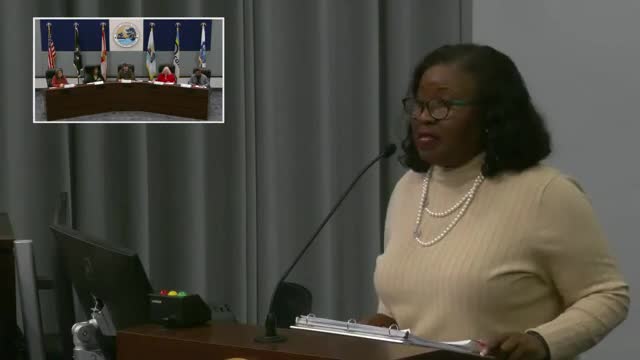Marion County presents mid‑year referendum spending: $4.2 million received, $15.7 million spent through Dec. 31
Get AI-powered insights, summaries, and transcripts
Subscribe
Summary
District staff reported fiscal year 2024–25 referendum revenue and spending through Dec. 31, 2024, outlined program‑level budgets and highlighted safety upgrades, vocational and fine arts spending and charter allocations.
District staff told the Independent Citizens Referendum Oversight Committee on Jan. 23 that referendum proceeds for the current fiscal year are budgeted at $37.3 million, with expenditures budgeted at $43.1 million; as of Dec. 31 the district had received about $4.2 million in referendum revenue and spent approximately $15.7 million, or about 36% of the budgeted expenditures.
The 1‑mill ad valorem referendum — the committee reviewed reporting covering the period July 1 through Dec. 31, 2024 — supports reading, physical education, art, music, library/media, vocational programs, class‑size reduction, retention of state‑certified teachers and paraprofessionals, and school safety. The district reported a beginning fund balance of $11.7 million and projects an ending fund balance for 2024–25 of about $5.9 million.
Presenters outlined program budgets and mid‑year expenditures:
- Class size reduction (kindergarten paraprofessionals): Budgeted $6.0 million; 177 paraprofessional positions budgeted, 169 filled and 8 vacant as of Dec. 31; about 45% of the category budget spent to date.
- Physical education: Budgeted $9.5 million; 106 PE teachers (3 vacancies) and 25 PE technicians (2 vacancies); roughly 40% spent. Staff highlighted a November elementary soccer jamboree with 288 student participants and nearly 300 parents in attendance, supported by community partners.
- Vocational/CTE: Budgeted $2.4 million; referendum funds support staffing, equipment, licenses and classroom technology across 40 CTE pathways with more than 15,000 student enrollments. District presenters said 60% of seniors indicated plans to pursue additional education, 22% employment, 8% entrepreneurship and 8% military enlistment (percentages reported by staff during the presentation). Referendum funds help maintain equipment that district staff said contributed to recent student wins in state competitions.
- Library media: Budgeted $4.0 million to support 48 media specialists (all certified as of December); Beanstack digital systems used for classroom library approvals and as a district reading log; staff reported 13,910 titles reviewed and 805,913 minutes logged during a recent quarter reading challenge.
- Fine arts: Art budget $4.8 million (54 art teachers supported and 12 paraprofessionals), music budget $5.2 million (57 music teachers, 12 paraprofessionals); both programs reported roughly 41% of budgets spent to date. Staff highlighted student awards, district performances and community partnerships such as Fine Arts for Ocala (FAFO) and the Appleton Museum of Art.
- Professional development and induction: The district reported a New Teacher Academy and mentoring/lead structures for novice and early‑career educators. Staff said 233 novice teachers are assigned one‑on‑one mentors; mentor supplements are documented and paid at year end ($1,100 supplement cited). Professional development line requested $627,000 for the year and had not yet been spent as of the Dec. 31 report.
- Safe schools: Budgeted $9.6 million; ~21% spent to date. District staff described partial funding of school resource officer (SRO) contracts (a three‑year contract cycle) and said current contract positions total 63 SROs across partner agencies (district breakdown reported by staff: 41 with Marion County Sheriff's Office, 20 with the Okelo Police Department and 1 with City of Bellevue). The district told the committee it moved to the Syntegix wearable badge platform and implemented Alyssa’s Alert compliance in line with Florida Statutes; staff described upgrades to intercom and mass‑notification systems (voice calls, text, push notifications, desktop alerts, flashing scroll lights) to speed and standardize emergency messaging at school sites.
Charter school allocations: The district said it has allocated $746,000 to charter schools based on enrollment ratios; about $358,000 had been distributed as of Dec. 31 and charter schools submitted budgets mirroring district categories (personnel is the majority of charter budgets, per staff). Charter schools will be audited on their use of funds at year end.
Committee members asked clarifying questions about carryover figures, vacant positions and the timing of purchases (district staff said some low spending percentages reflect equipment and materials that were ordered but not yet paid as of Dec. 31). The district also noted a reclassification of certain teacher positions between the referendum and general fund staffing, which affected mid‑year budget presentations.
Dr. Diane Gullett, the superintendent, asked the committee to note partnerships as part of the referendum’s impact: "I would like for you just to... think about that as we are providing any updates," she said, urging members to consider how community partnerships support programs funded by the referendum.
No formal budget amendments or new spending motions were made at the meeting; the presentation was informational and intended to provide the committee with documentation to monitor compliance with the referendum's allowable uses.
Speakers and presenters on the financial and programmatic report included district staff responsible for finance and program areas: the district finance lead (presentation of revenue/expenditure totals), Cornelia (physical education), vocational/CTE staff, library/media staff (Beanstack and media certification), fine arts staff (art and music), professional learning specialists (New Teacher Academy and mentoring), and Dennis McFadden (safe schools). Dr. Gullett and other district leaders participated in Q&A with committee members.
The committee requested a follow‑up with an updated final report to capture remaining prior‑year expenditures; district staff agreed to update the next report to reflect late invoices and reconciliations.
